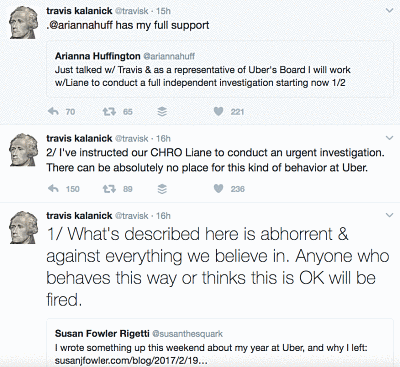 #deleteuber trends once again–sparked by a blogpost written by a former Uber software engineer, alleging not only wanton sexual harassment, but also numerous human resources failures.
#deleteuber trends once again–sparked by a blogpost written by a former Uber software engineer, alleging not only wanton sexual harassment, but also numerous human resources failures.
In a personal blog post, “Reflecting On One Very, Very Strange Year At Uber,” Susan J. Fowler alleges receiving inappropriate e-mails from her new boss on her first day assigned to his department. An immediate complaint to HR resulted in Uber excusing away the bad behavior because it was his first offense (Fowler later alleges this was a lie) and because he was a high achiever.
Fowler notes that when she started, women made up about 25% of her department. When she left, a year later, that number was down to 3%.
Sexism has long history at Uber
As bad as it sounds, the sexist corporate culture at Uber doesn’t surprise me. Bad behavior by the company and it’s CEO frequently make news.
In 2014, when Uber was worth a mere $3.4 billion, GQ published an article in which Uber CEO and Co-Founder Travis Kalanick made a joking, off-hand reference to an app for women-on-demand, calling it “Boob-er.”
Also from 2014, BuzzFeed published a story on an Uber promotion in which French customers could use a code and get a “hot chick” driver.
While the professionalization of Uber’s pr flacks diminished outward-facing gaffs such as these (Uber hired David Plouffe in August 2014), it’s sad to see that similar professionalization did not grow internally.
Uber’s human resources horror show
The HR misdeeds alleged by Fowler surprise and startle.
After filing her initial complaint, she was allowed to report back to the same manager. Human resources told her to expect a poor job rating from him. I guess Uber thought that was the cost of coming forward.
Fowler discovered that other women had complained about the same manager, so it wasn’t his first time.
Later, a different manager illegally threatened her job. Instead of following up on Fowler’s complaint, hr used it as an opportunity to interrogate her. HR wanted to know if, when, and how women in the department communicated with each other.
#deleteuber redux
Reaction to Fowler’s post sparked a fresh round of #deleteuber across social media. Of course this is the second surge of the hashtag this month. Uber triggered the first round of upset when it appeared to undermine a taxi protest of Trump’s Muslim ban at JFK. The New York Times reported 200,000 deleted Uber accounts in early February after the first wave of #deleteuber.
Kalanick’s resignation from Trump’s advisory panel seemed to have quieted that round of protest. This new cycle does not arise because of ties to Trump.
Uber created this mess all on its own.
Kalanick asks for investigation
 This round of #deleteuber doesn’t seem to have the same initial push of the one that followed the Muslim ban. But it received quick attention from Uber CEO Kalanick who took to Twitter shortly after the initial wave. He called for an ‘urgent’ investigation to be headed by Uber Board Member Ariana Huffington and Chief Human Resources Officer Liane Hornsey.
This round of #deleteuber doesn’t seem to have the same initial push of the one that followed the Muslim ban. But it received quick attention from Uber CEO Kalanick who took to Twitter shortly after the initial wave. He called for an ‘urgent’ investigation to be headed by Uber Board Member Ariana Huffington and Chief Human Resources Officer Liane Hornsey.
Urgent, fine, but an independent investigation would be most productive. An investigation headed by two insiders can’t be independent.
Perhaps Uber can fund a truly external investigation by using part of that fake $3 million fund they created to help drivers stranded by the Muslim ban. I have only seen one news report of a driver’s family assisted through the Uber fund.
I assume plenty of that money remains unused.
